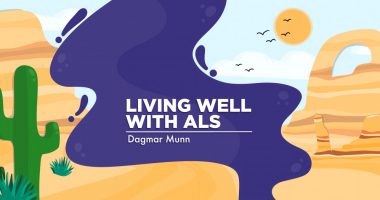Voicing my approval of a mental health resource for those with ALS
Addressing the feelings of depression, grief, and anxiety that go with diagnosis

Every once in a while, I step onto my soapbox (mine has special safety rails) to voice my view about an important issue in the ALS community. This time, I’m here with praise for “ALS and Mental Health,” an article recently published in ALS News Today. In my opinion, it not only validates the elephant in the ALS patient exam room — feelings of depression, grief, and anxiety — but it also offers us concise and useful resources.
It hasn’t always been this way
Newly diagnosed patients might think, “Well, hasn’t emotional health always been included in patient care discussions?” No, it hasn’t.
When I learned I had ALS in 2010, a solid 13 years ago, the prognosis was only two to three years of life following diagnosis. This shortened timeline emphasized how to deal with the progression of physical symptoms. I was handed a thick manual filled with photos and descriptions of medical equipment I could expect to use. My husband and I were told to check if our home had enough room to accommodate a Hoyer lift, a hospital bed, and me rolling throughout in a power wheelchair. All very good advice, but it didn’t leave much time to have a conversation about how I was feeling.
The usual parting suggestion was that I could be referred to a grief counselor or to someone in hospice to talk about death and dying, if I felt I needed it. Those are good resource people, but I needed help developing coping skills, balancing my well-being, and strengthening my emotional resilience.
“We all have an end,” school psychologist Amanda Sifford, who has ALS, says in the article. “Unfortunately, when you have an ALS diagnosis, it just feels like it’s hanging over your head — at least, until you adjust and accept the situation.”
Adjust and accept
I found it challenging to process my condition through the stages of grief and finally feel ready to accept my new circumstances. Along the way, I read blogs written by ALS patients. Most expressed their anger, shock, and sadness while posting photos of their slow demise.
Meanwhile, I pieced together a simple formula for daily living, one that combined my knowledge of wellness with the adjustments required to live with my ALS. I decided to add my voice to the ALS community and began my “ALS and Wellness Blog.”
Do ALS patients feel depressed?
Still, I noticed the ALS medical community was slow to recognize the need for mental health resources and offer them to patients and caregivers.
Four years ago, I wrote this column about my surprise that the medical community was only beginning to identify depression among ALS patients. I wondered why we needed multiple studies to ascertain if having ALS caused patients to feel negative emotions. Really?
Almost one-quarter of ALS patients experience depression. The risk of depression is often highest immediately before a person is diagnosed and soon afterward. Really?
We need information to help us deal with anxiety, depression, and apathy. Information to help us cope and thrive. You’ll find it all in the ALS News Today article. That’s why I’m applauding this website for adding this excellent resource. If you’re a patient, caregiver, or in a circle of support, I encourage you to bookmark it.
Because this resource is one more valuable way we can learn to live well while we live with ALS.
Note: ALS News Today is strictly a news and information website about the disease. It does not provide medical advice, diagnosis, or treatment. This content is not intended to be a substitute for professional medical advice, diagnosis, or treatment. Always seek the advice of your physician or other qualified health provider with any questions you may have regarding a medical condition. Never disregard professional medical advice or delay in seeking it because of something you have read on this website. The opinions expressed in this column are not those of ALS News Today or its parent company, BioNews, and are intended to spark discussion about issues pertaining to ALS.








Comments